Our return visit to Southwell turned out every bit as entertaining as last year, the layout has been tweaked to make the site a little more compact whilst the festival has grown a little bigger with 3 stage marquees plus the bar stage and an outside dance stage, most in operation for 3 full days plus Thursday evening. Headline acts ranged from the Celtic/World fusion of Kila, the song writing and multi-instrumental prowess of Show of Hands, the eclectic, fascinating song choices of Eddi Reader to the out and out good-time rockgrass of Hayseed Dixie. The range of supporting artists was even wider and thoroughly justifies Southwell calling itself a roots and acoustic music festival rather than a folk festival.
North American music from a variety of genres was an important part of the weekend. Five imported bands, three US and two Canadian, were on the programme whilst twice that number of home grown UK artists declared themselves as one or more of bluegrass, swing, old time, blues, alt country, plain old-fashioned country or Americana. And, on top of all that, in a two-hour session over Saturday tea time, we had a concert to celebrate Bob Dylan’s 75th birthday. Organised by Jim Moray, we were treated to 21 of Dylan’s songs. Arrangements varied from Mick Ryan’s solo singing of Only a Pawn in Their Game, through to those featuring the house band (Jim Moray on guitar, Matt Downer on bass, Sam Nadel on drums) backing the vocals of Pete Morton, Jackie Oates and Meaghan Blanchard. For the final three songs the stage was packed with all of the above plus Steve Knightley, Phil Beer, Paul Downes, The Henry Girls and The Ooks of Hazzard belting out Like a Rolling Stone, Don’t Think Twice It’s Alright and Blowing in the Wind. In between there’d been some memorable performances, The Henry Girls with If Not For You, featuring expressive dancing from Leon’s very young daughter, yes, Leon of vegetarian food stall fame. The Ooks of Hazzard with Everybody Must Get Stoned, and the house band joining Phil Beer and Steve Knightley for Positively 4th Street. A credit must also go to the audience in a packed Big Top, a lot of people know a lot of Dylan lyrics and they sang them every chance they had. I imagine many people missed their evening meal on that crowded Saturday but I doubt any of them regret it, one of those never to be forgotten festival events.
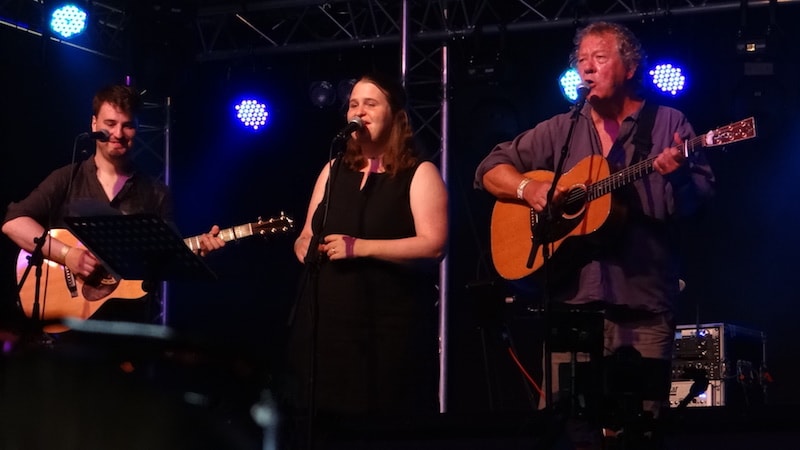
Jim Moray, Jackie Oates, Paul Downes
The Fates long ago decreed that my festival wanderings wouldn’t cross those of Hayseed Dixie between Cropredy 2011 and Southwell 2016. Over five years you’d expect a band to change; personnel, repertoire, and yes, there are differences but the spirit of the band is undimmed. They’re going on stage to have a good time and they’re determined to carry any audience along with them. Proud to have invented the rockgrass genre, their line-up of guitar, bass guitar, banjo, mandolin and occasional fiddle, wielded with power and musical skill, ensures that any song they tackle hits the spot. Whether it’s one of the ever growing collection of their own compositions or their trademark treatments of classic rock tracks, they come across as one of the all-time, good time festival bands. Subtle it isn’t, hugely enjoyable it most certainly is.
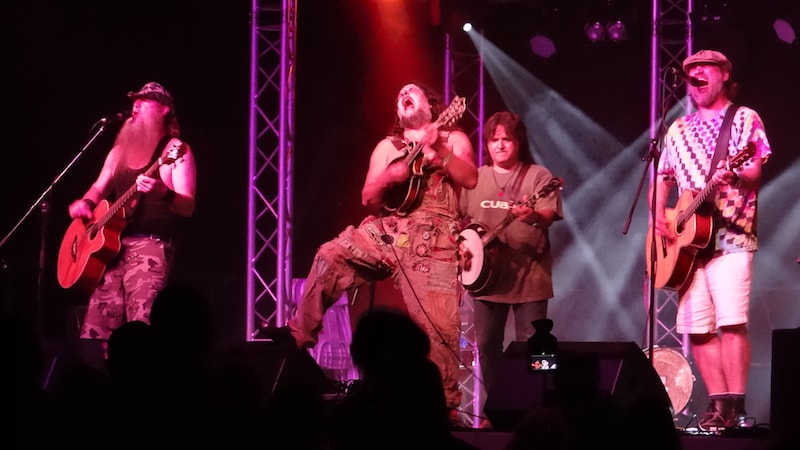
Hayseed Dixie
Taking the stage immediately before Hayseed Dixie, The Ooks of Hazzard from California, inevitably invite comparison, they too have forged their reputation in part by performing well known songs in unfamiliar ways. In their case it’s by having a front line with a minimum of 4 ukuleles along with drums and bass. There are plenty of ukulele bands and players around nowadays, indeed The Ooks were in the UK to play at Cheltenham’s Ukulele Festival of Great Britain the following weekend. So, to stand out from the ukulele crowd, bands do need something a bit special. In The Ooks case this was using the slide ukulele. Its first appearance, on the very tongue in cheek Texas anthem, Up Against The Wall Redneck Mother, produced an instant audience response that carried through to the end of the set. It even played a starring rôle the following day in the band’s contribution to the Dylan concert.
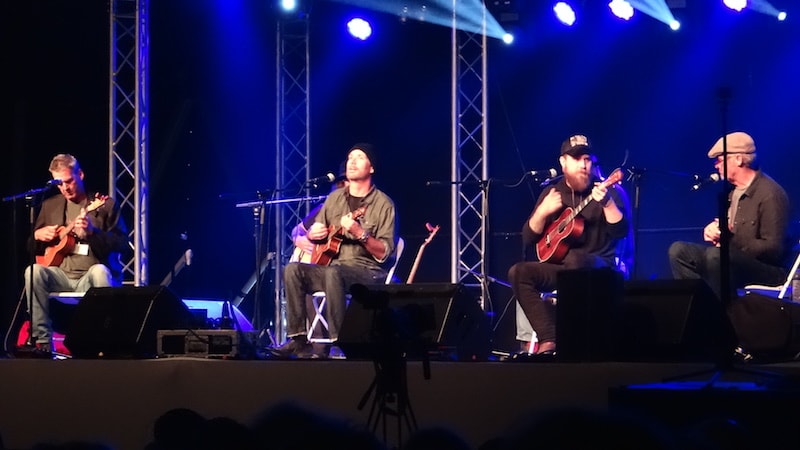
The Ooks of Hazzard
It’s tempting to say that the third band over from the US, The Corn Potato String Band, take their music more seriously. But that would be grossly unfair to all three bands. On the one hand, you don’t get to present the rip-roaring shows of the Ooks and the Hayseeds without first being seriously dedicated to the mastery of your instruments. And, whilst the three members of The Corn Potatoes, Aaron Jonah Lewis, Lindsay McCaw and Ben Belcher are very serious about keeping alive old time fiddle and banjo music, there’s nothing staid about their stage presentation. It’s guaranteed to bring a smile to everyone’s lips and leave you all feeling thoroughly uplifted. The instrumental mix is, at times, bewildering in a most entertaining way. All three can play fiddle, banjo and guitar and do so in just about any combination. But it was their vocals, the three of them grouped around a condenser mic, producing delightful close harmonies, that lingered longest in my memory.
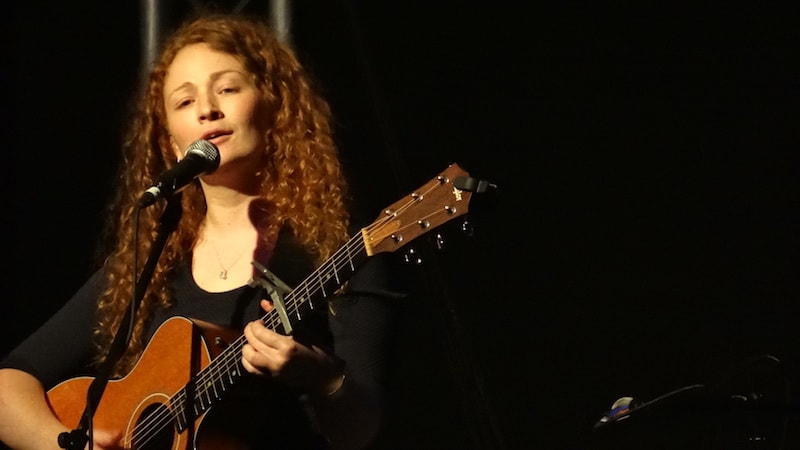
Meaghan Blanchard
The Canadians, solo singer Meaghan Blanchard and Acadian trio Vishtèn both hail from PEI (Prince Edward Island) and were invited to Southwell following a trip over there by two of the festival’s organising committee. Meaghan grew up steeped in music, and even though PEI is around 1500 miles away from country music’s US heartland, her grandparents were part of a band playing “that good old fashioned country music” and so the die was cast. But whilst the family band was playing covers, from around 11 onwards, Meaghan began writing her own songs, accompanying herself on guitar. And so, young as she still is, she’s had quite a few years to hone her skills and the result was clear in the Southwell Big Top. A polished, quality performance of music that delivers a strong emotional punch. The style may have its roots in Nashville but the songs are firmly rooted in the rich cultural soil of PEI.
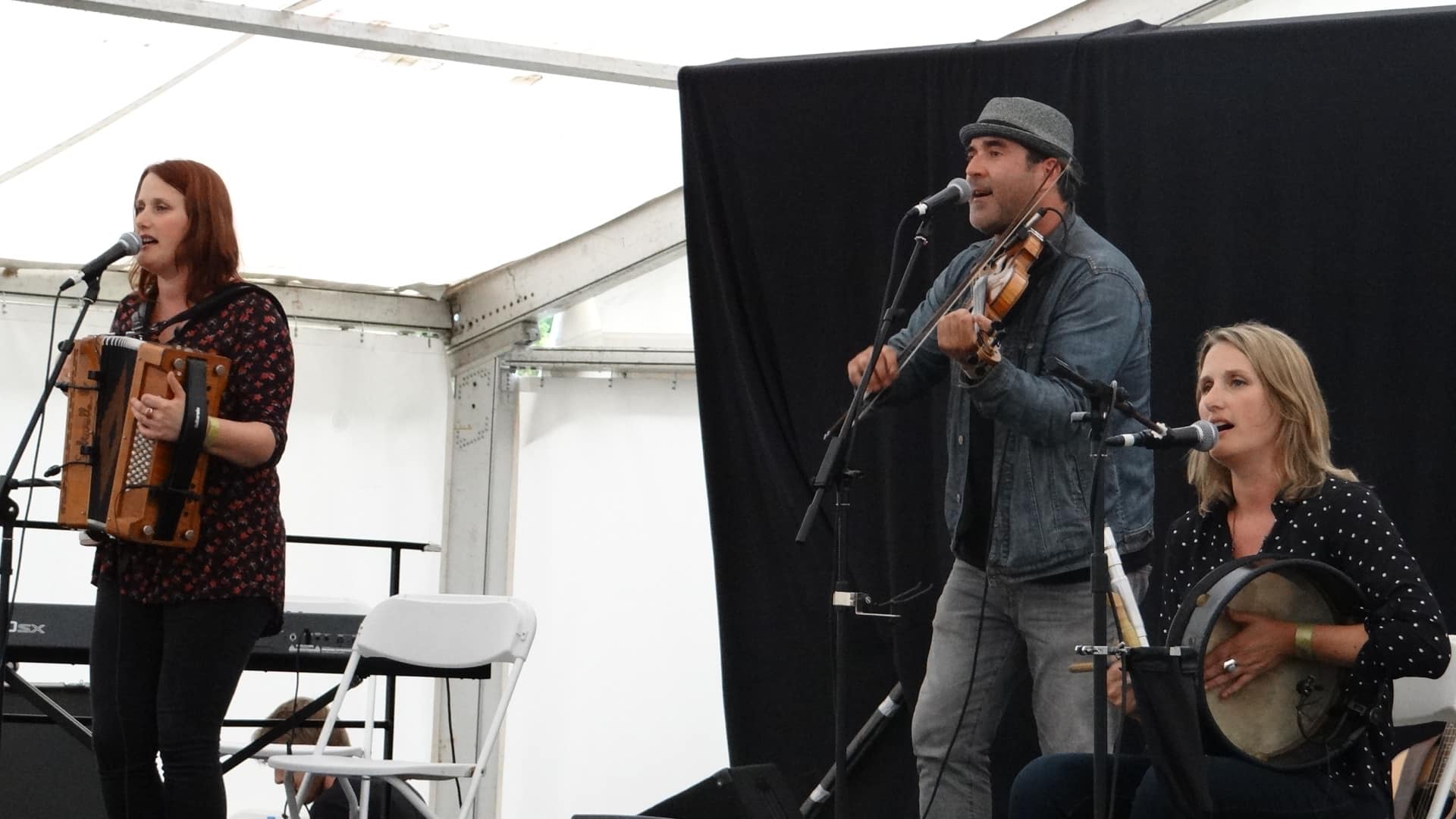
Vishtèn
In contrast, just about everything in Vishtèn’s music is rooted in the small French speaking communities of PEI and its tiny off shore neighbours the Magdalen Islands. Twin sisters Emmanuelle and Pastelle LeBlanc grew up on PEI whilst third member, Pascal Miousse, is a Magdalen islander. Vishtèn have been around since 2000, part of a vibrant and expanding francophone traditional and contemporary music scene in Canada’s Maritime provinces. Away from home they’ve toured extensively in the US, France, Australia but, astoundingly, this spring has seen their first visit to Britain. After the reception their performances received at Southwell it surely won’t be their last.
Having become quite an enthusiast for French-Canadian music over recent years, particularly Québecois bands Le Vent du Nord and De Temps Antan, it was fascinating to listen to music that, whilst sharing the same origins, Canada’s 17th Century French settlers, has evolved differently over centuries of geographical and politically enforced separation. One of my first questions when I sat down to chat with Emmanuelle and Pastelle was to ask how they would characterise the differences between Québecois and Acadian music. Very much a question that begs the reply, do you want the short answer or the one you can turn into a doctoral thesis? In brief, you should look at the fellow migrants that settled in the two areas. In Québec they were predominantly Irish and in the Maritimes (Acadia), Scottish. Nowhere is the effect of this more evident than with Pascal’s fiddle. The foot-tapping rhythms, podorythmie, that characterise French-Canadian music, are also noticeably different, the Acadian variety having far more of a swing to them. Vishtèn are not afraid to bring wider influences into their music, both contemporary and with a conscious nod to their Acadian cousins who migrated south to Louisiana and gave us Cajun music. Whatever the sources, the combination of largely traditional songs with arrangements that use both traditional and more modern instruments generated superb audience reactions each time they played. I do hope it won’t be long before we see Vishtèn over here again and maybe next time I’ll get the chance to join in their podorythmie workshop.
There were some familiar faces amongst UK based artists contributing to the weekend’s North American vibe. The alt country of James Edwyn and the Borrowed Band made a really strong impression when I came across them a few weeks ago at Oban Live. They played 3 sets over the Southwell weekend, winning over plenty of new friends in the process. The strength of their vocals, James taking lead with Emma Joyce a ubiquitous presence alongside him, was once again impressive, even more so when keyboard player Scott Keenan added his voice. In Ronnie Gilmour they have an electric guitarist whose breaks are a perfect foil to the melodies, reminiscent at times of classic Byrds. Cornwall’s Flats and Sharps have been getting noticed for a few years now. They describe themselves as “blurring the lines between Bluegrass, Folk, Country and Pop” and all those elements were there in abundance as they veered between classic banjo, fiddle, mandolin tunes and showcasing self-penned tracks from their album, King of my Mind, released earlier this year. On balance, I’d say Bluegrass won out in their live set as they focused on fast-paced songs and tunes guaranteed to delight a festival audience.
In part 2 we’ll turn the spotlight onto music sourced from closer to home, picking out a strong Irish contribution from Kila, The Henry Girls and The Jeremiahs, the almost Irish Sam Kelly and the Lost Boys and the undeniably English Jackie Oates and Mawkin plus the ¾ English ¼ Welsh of The Teacups.
